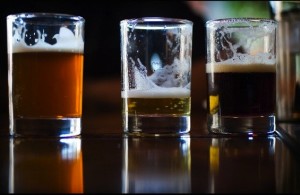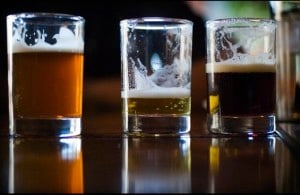Search for topics or resources
Enter your search below and hit enter or click the search icon.

I went to an evangelical Christian college that did not permit the consumption of alcohol. I grew up in a household and a conservative church culture--Midwest to boot--where drinking was out of the question and seen as bereft of goodness. I’m the child of an American evangelicalism that has had a decidedly contentious (to put it mildly) relationship with alcohol (see “Christians and Alcohol: A Timeline”).
But as I grew older, left home and left college, I came to see that drinking alcohol is a) not forbidden by Scripture (as opposed to drunkenness, which is) and b) actually quite wonderful. Like many of my peers who grew up in similar environments, I became rather fond of drinking fermented beverages in social settings, whether a Cabernet with dinner, IPA with friends or a single-malt scotch on special occasions.
 Over time I noticed that it seemed increasingly popular amongst my fellow “twentysomething Christians” to embrace the fullest extent of liberty in the area of alcohol. I attended church small groups where beer and cocktails were regularly consumed; I went to parties where dozens of Christian college students and alumni were drinking from kegs and doing Sake bombs; I visited churches that met in bars; I went to Christian conferences where the “after parties” were raucous affairs at pubs; I met Christian beer critics, bartenders, pub owners.
Over time I noticed that it seemed increasingly popular amongst my fellow “twentysomething Christians” to embrace the fullest extent of liberty in the area of alcohol. I attended church small groups where beer and cocktails were regularly consumed; I went to parties where dozens of Christian college students and alumni were drinking from kegs and doing Sake bombs; I visited churches that met in bars; I went to Christian conferences where the “after parties” were raucous affairs at pubs; I met Christian beer critics, bartenders, pub owners.
I’m not saying any of this is inherently bad. In fact much of it is to be celebrated as harmless, good-old-fashioned “exhilaration,” as in the famous Martin Luther quip, “we should not be drunken, though we may be exhilarated."
What worries me is this question: Are we so embracing our Christian liberty to partake of alcohol that it threatens to become less a “liberty” and more a shackling legalism--something we can’t, or won’t, go without? As my pastor Alan often says, are we as free to abstain from alcohol as we are free to enjoy it?
Other questions I think many of us would do well to ask ourselves:
Christians have the “right” to consume all sorts of things, though we are told not everything is beneficial or constructive (1 Cor. 10:23). Rather, we are instructed, “whether you eat or drink or whatever you do, do it all for the glory of God” (1 Cor. 10:31) and “do not cause anyone to stumble” (10:32).
This last part is key, something the Apostle Paul routinely emphasized (especially in Rom. and 1 Cor.). Because it is true that Christians have differing tolerances (“One person’s faith allows them to eat anything, but another, whose faith is weak, eats only vegetables,” Rom. 14:2), we should not pass judgment on or treat with contempt those with different liberties than us.
But we must also be real with ourselves. What’s the point of freedom if it doesn’t free us to enjoy, but also to abstain from, something in culture? And it goes beyond alcohol. There are all sorts of good items and activities in culture that we are free to enjoy in moderation. Food, fitness, movies, music, travel, sports, gaming, and on and on. But the minute any of this becomes something we can’t live without, or something we excessively consume to the point that we need it more than we enjoy it, we should be concerned.
Because ultimately, the goodness of something that we might consume is at its most good when we enjoy it in a God-centric way rather than a me-centric way. That is: when we see it as a gift from God and something to reflect glory back to him, rather than something that serves us and our needs.
Alcohol, like food or any number of things in God’s created world, is a good thing that can become a bad thing if we consume it recklessly, excessively or selfishly. It’s good insofar as we consume it not as something we must have but as something we can have, as a special delight of God’s glorious creation, which includes man’s creative (fermenting) genius. The freedom to drink should not be a freedom to drown one’s sorrows, prove a point or get a fix; it should be a freedom that fixes our eyes ever more on Christ, the giver of life who turns water into wine and makes all things new.
This is the third in a series of posts on contemporary Christianity’s relationship to culture, based on ideas from my new book, Gray Matters: Navigating the Space Between Legalism and Liberty (Baker Books). See also: part one and two.
Brett McCracken is a Los Angeles-based journalist. He is the author of Hipster Christianity (2010) and Gray Matters (2013), and has written for the Wall Street Journal, the Washington Post, CNN.com, the Princeton Theological Review, Mediascape, Books & Culture, Christianity Today, Relevant, IMAGE Journal, Q Ideas, and Conversantlife.com. A graduate of Wheaton College and UCLA, Brett currently works as managing editor for Biola Magazine and teaches at Biola University. Follow him on Twitter @brettmccracken.